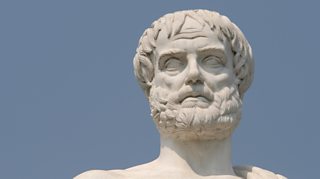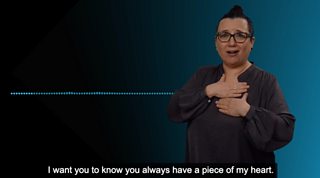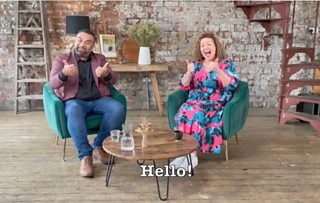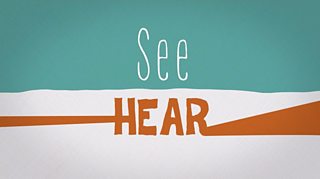Nine things not to say to a deaf person
What a time it is to be deaf with Rose Ayling Ellis winning Strictly Come Dancing, Troy Kotsur picking up the Best Supporting Actor Oscar for CODA, and the recently being passed, making BSL a legally recognised language of the UK.
But there’s still work to be done.
To mark , Camilla Arnold, series producer of See Hear, the Βι¶ΉΤΌΕΔ's magazine programme for the deaf and hard of hearing community, explains what you should definitely NOT say to a deaf person.
1. You don’t look deaf?
No, because what should a deaf person "look like"?

Should we have horns and scaly skin?
Our deafness is often hidden.
Some of us wear hearing aids, some have a cochlear implant, and some don't wear anything at all, but we don't walk around with a banner, badges, and flashing lights to declare our deafness.
2. You speak very well for a deaf person
Thank you…I guess…but no, thank you, as you’re suggesting that there are deaf people with ‘bad’ speech out there, which isn’t a nice thing to say.
It also implies that seeming more ‘hearing’ than deaf is better and that being deaf isn’t great.
3. But you can’t hear music?
Yes, I can with my hearing aids, and I love music.

Some deaf people can’t hear music, but they love music too, as they’ve experienced music through feeling the beat, vibrations, or simply watching performances and concerts.
Since 2009, DeafZone, a team of British Sign Language (BSL) interpreters, have worked at Glastonbury to cover music performances on the Pyramid and other stages.
Some deaf people aren’t bothered about music, and that’s fine too!
4. Never mind
Never ever say "never mind".
You are outrightly excluding a deaf person from a conversation if you refuse to repeat what was said.
The fact that you've felt the need to say something in the first place means that it was clearly important, so a deaf person should be allowed access to it through repetition.
5. You’re deaf and dumb, right?
No, I’m not. I’m just deaf.

Deaf and dumb is an archaic, offensive terminology used many moons ago. Don’t use it. Ever.
The Greek philosopher, Aristotle, called us “deaf and dumb” because he felt that deaf people were incapable of being taught, learning, and having reasoned thinking. To his way of thinking, if a person could not use their voice in the same way as hearing people, then there was no way that this person could develop cognitive abilities- in other words, they are “stupid”.
The deaf academics, CEOs, FCOs and generally all deaf people are living proof that this is not true.
6. Can you lipread me?
Yes, I can lipread you; otherwise, how would I know what you’re saying right now?
But don’t expect me to carry the burden of lipreading to enable us to communicate. Instead, you should share the load and put in some effort through gestures, deaf awareness and being as clear as possible.
A little fact for you, though- not all deaf people can lipread!
7. I’m sorry you’re deaf
Don’t be.

Many of us are proud to be deaf and have a strong sense of deaf identity. Many of us love being part of a culture that is rich in history. Did you know composer Beethoven and inventor of the lightbulb, Thomas Edison, were both deaf?
We have a vibrant arts scene, and our own programme See Hear is the Βι¶ΉΤΌΕΔ’s fifth oldest factual series. We have our own successful sporting stars - did you know we have our own Deaflympics, which pre-dates the Paralympics. Our linguistics is incredibly diverse, and BSL has regional dialects and accents.
Of course, every deaf person is different and has different living experiences and feelings about their deafness.
8. I know a bit of sign language….
What sign language do you know exactly?

If it is swear words or made-up ‘rude’ signs you were taught in the playground, that won’t help you and me have a friendly introductory conversation.
Why don’t you go online and learn the alphabet and other practical basics instead?
9. I hate subtitles
Well, we hate that attitude.

More and more people rely on subtitles now, whether they are deaf or hearing. Research by captioning charity Stagetext found that young people are almost four times more likely to watch TV with subtitles than older viewers.
Try turning off the sound and following your favourite programme - it’s pretty much impossible. So, please don’t complain about subtitles being on in cinemas or your TV. You’ll find it helpful!
Finally, if you meet or know a deaf person, please do not assume we are all the same.
We’ve all had different personal experiences and have different methods of communication. Try learning a few signs (not the rude ones, mind!) and some deaf awareness – there are plenty of online resources.
A little bit of sign language and deaf awareness goes a long way!
Find out more
See Hear is the Βι¶ΉΤΌΕΔ's fifth oldest programme and champions the Deaf and hard of hearing community.

It broadcasts on Βι¶ΉΤΌΕΔ Two on the first Wednesday of the month at 8am and on iplayer.